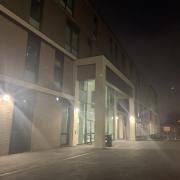
Ever hard the saying 'you snooze, you lose'? Well there may be some truth to that statement. Research suggests that hitting your 'snooze button' every morning could be negatively impacting your day, and heres why.
We’ve all felt the urge to press the ‘snooze button' when the alarm clock sings at an all too early hour. As many people are now fully in the swing of work or school, sleep is getting more precious and desirable everyday. A study by YouGov Omnibus concluded that around 37% of British people admit to pressing the ‘snooze button' at least once and a further 14% of British people admit to pressing the ‘snooze button' three or more times per morning. And what better way to start the morning off by falling back to sleep? Well actually it may be nice to have those few extra moments in bed, but snoozing can impact our energy levels throughout the day. This means that when you tell yourself, ‘Only nine minutes more, it can’t possibly do any harm!’ You are very wrong.
Pressing the ‘snooze button' has been proven to negatively affect your day for many reasons.
First and foremost, even being woken up by an alarm is bad for you. This is because the loud and surprising ‘beep’ of the alarm, shocks you into waking up as the loud sound interrupts your sleep. Have you ever heard the particular sound of your alarm randomly during the day and tried to turn it off as soon as possible as that sound makes you anxious or frustrated? Well, that is normal as being aggressively pulled from sleep, like when you wake using an alarm, causes a change in chemicals in the nervous system which results in a spike of blood pressure and an acceleration in heart rate. This sudden change in the body’s condition can lead to feelings of stress and anxiety. Although, i do know that many people do need an alarm to wake as they don’t naturally wake up at the time they need to, so being woken by a alarm seems fairly reasonable even with the consequences. However, by pressing the ‘snooze button' again and again, this bodily response is repeated again and again which impacts the body in a negative way and could lead to further feelings of dread and anxiety. You also put more stress on the body by constantly surprising it with the loud alarm sound, which also leads to increased feelings of anxiety. As well as this, by pressing the 'snooze button', you are messing with the normal way the body wakes up as the alarm tricks the brain into thinking that it is going back to sleep. This way of messing with the body’s natural sleep patterns leads to tiredness later on as the body did not properly wake up in the right way. Don’t press the 'snooze button' as it repeatedly changes the balance of chemicals in the body and plays games with the brain by suggesting that you can go back to sleep - when you really need to get up and get that train to work!
As well as this, you could be the subject of sleep inertia. Sleep inertia is a state where the cognitive and sensory motor performance is impaired and weak meaning that the brain isn’t mentally sharp or fully aware of what is happening. This means that the person suffering with sleep inertia feels very groggy and confused when they wake up. This is because their body hasn’t gone through the correct stages of waking particular parts of the brain and body up, before performing certain tasks. Sleep inertia is a result of being woken up suddenly during REM sleep. REM sleep is rapid eye movement sleep and is a phase of your sleep cycle where the body and brain are energised and dreams occur. Once woken from this sleep, the person may feel confused as they have been taken from that dream-like state back into the real world without really being aware. This just shows how hitting the ‘snooze button' could result in a bad and confusing start to the day as well as feeling more tired later on.
The statement is true; 'you snooze, you lose'. The 'snooze button' really does impact you, whether you feel tired and groggy in the morning or lacking energy halfway through the day, this could all be down to the fact that your body didn’t wake up naturally or properly. Maybe, tomorrow morning, set your alarm for ten minutes later so that you won’t have enough time to be able to press the 'snooze button' - I promise you, you will feel better for it.


























